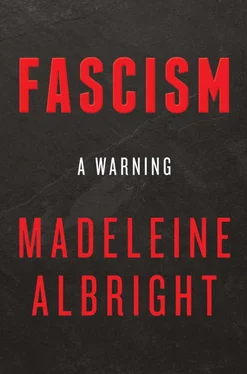Sadly, many more names could be added to this list, from Nicaragua’s Daniel Ortega to Rwanda’s Paul Kagame to Azerbaijan’s Ilham Aliyev to the longest name of all, Gurbanguly Berdimuhamedow, self-described “protector” of Turkmenistan. Power is, as we know, an addiction prone to abuse. Even those who enter public life with the best of intentions are susceptible to its pull. We ought, therefore, to be mindful of our own bad habit—which is to look for and expect easy answers when the most serious problems we face are anything but. We might want to remember the explanation that Hitler gave, in 1936, for his popularity: “I will tell you what has carried me to the position I have reached. Our political problems appeared complicated. The German people could make nothing of them…. I, on the other hand,… reduced them to the simplest terms. The masses realized this and followed me.”
ON THE NINETEENTH OF OCTOBER 2017, I TOOK THE TRAIN TO NEW York for an event convened by George W. Bush in celebration of the “Spirit of Liberty.” Years ago—when Bush was president and I had just set out on my new career as a former somebody—we disagreed often about matters of policy. However, I have always admired the man’s easygoing optimism and his personal decency, qualities that have become far less common in public life than they should be.
On this occasion, he had an important message to convey. Speaking quietly but firmly, the ex–commander in chief warned against the degradation of political conversation in the United States and overseas. He found fault with relentless partisanship, the revival of isolationist and protectionist sentiments, the twisting of national pride into nativist bigotry, and the witless acceptance by some of conspiracy theories and outright fabrications. “We know, deep down,” he said, “that repression is not the wave of the future…. We know that free governments are the only way to ensure that the strong are just and the weak are valued. And we know that when we lose sight of our ideals, it is not democracy that has failed. It is the failure of those charged with preserving and protecting democracy.”
During my opportunity to speak, I expressed alarm—as I often do—at those now in office who think the United States can get by without help from its friends. In my view, we need to work well with others, whether we are trying to stop terrorists, halt the spread of nuclear arms, raise living standards, preserve the environment, prevent epidemic disease, put international drug dealers in jail, or—yes—safeguard our borders. There’s no reason on earth why we should be afraid or unwilling to engage constructively. The idea that the United States is a nation of chumps that has spent the past fifty years getting ripped off by wily foreigners is absurd. The suggestion that our country can back away from its responsibilities in an era at least as dangerous as any other is just plain sad. That’s not the America I recognize.
As secretary of state, I was proud to join presidents George H. W. Bush and Bill Clinton in calling the United States “the indispensable nation.” I worry today that the country is, by its own choice, becoming less admired and less relevant in shaping world affairs. Partly for this reason, I believe that Fascism and Fascist policies pose a more virulent threat to international freedom, prosperity, and peace than at any time since World War II. I am drawn again to my conclusion that a Fascist is someone who claims to speak for a whole nation or group, is utterly unconcerned with the rights of others, and is willing to use violence and whatever other means are necessary to achieve the goals he or she might have. Throughout my adult life, I have felt that America could be counted on to put obstacles in the way of any such leader, party, or movement. I never thought that, at age eighty, I would begin to have doubts.
THE SHADOW LOOMING OVER THESE PAGES IS, OF COURSE, THAT of Donald Trump. He is president because he convinced enough voters in the right states that he was a teller of blunt truths, a masterful negotiator, and an effective champion of American interests. That he is none of those things should put us on edge, but there is a larger cause for unease. Trump is the first anti-democratic president in modern U.S. history. On too many days, beginning in the early hours, he flaunts his disdain for democratic institutions, the ideals of equality and social justice, civil discourse, civic virtues, and America itself. If transplanted to a country with fewer democratic safeguards, he would audition for dictator, because that is where his instincts lead. This frightening fact has consequences. The herd mentality is powerful in international affairs. Leaders around the globe observe, learn from, and mimic one another. They see where their peers are heading, what they can get away with, and how they can augment and perpetuate their power. They walk in one another’s footsteps, as Hitler did with Mussolini—and today the herd is moving in a Fascist direction.
For all their differences, there are also links that connect figures like Maduro, Erdoğan, Putin, Orbán, Duterte, and—the sole example among them of a true Fascist—Kim Jong-un. Each has tried to nudge followers away from the consensus of support for democratic norms that required decades of struggle and sacrifice to build. These willful men see access to high office not as a temporary privilege but as a means of imposing their own desires for as long as they can. In public statements, they display no interest in cooperation outside the specific groups they purport to speak for and represent. They all claim for themselves the mantle of “strong leader”; they all say they speak for “the people”; and they look to one another for help in further enlarging their ranks.
If this circle of despots hadn’t come into being, Trump’s dispiriting influence would likely be temporary and manageable, a minor malady from which a healthy body could rapidly recover; but when the law-based international order is already fighting off a variety of illnesses, the immune system is weakened. That is the peril we confront.
ONE OF MY PASTIMES IN RECENT YEARS HAS BEEN TO PARTICIPATE in think tank projects that assess, for example, the outlook for democracy in the Middle East and threats to political and social pluralism in the United States and abroad. Most often the process—which, God help me, I enjoy—entails getting smart, highly caffeinated people to sit together around a table, talk, nibble on cold cuts, and write recommendations that are circulated internally, revised, and published. Some might imagine that this is how elitists come up with Machiavellian plans for running the world. To those involved, however, it is an exercise in abject humility. Only very rarely do our painstakingly composed and earnestly argued reports have an impact, though I, for one, think the globe might profit should more people be willing to read, mark, and learn their contents.
Because the reports are out there and in need of consumers, I am not going to ask readers of this book to wade through a long list of proposals about purging excess money from politics, improving civic education, defending journalistic independence, adjusting to the changing nature of the workplace, enhancing inter-religious dialogue, and putting a saddle on the bucking bronco we call the Internet. We should do all these things and more; but would that be enough?
President Obama spent eight years trying to push the United States forward in most of these areas, with some success. His administration’s tax and spending policies were aimed directly at lifting wages for low- and middle-income people. The Department of Education promoted lifelong learning, vocational training, and reduced tuition costs while taking on a handful of high-profile for-profit universities that were ripping off students. The president tried hard to bring a healing presence—even a touch of “Amazing Grace”—to the racial divide. More than any of his predecessors, he was attuned to social media and the complex realities of the cyberworld. He was as zealous in enforcing immigration laws as he was creative in trying to find a legal path for the deserving to become citizens. He inherited an economic meltdown and left office following the longest sustained expansion of private sector employment in U.S. history.
Читать дальше
Конец ознакомительного отрывка
Купить книгу












